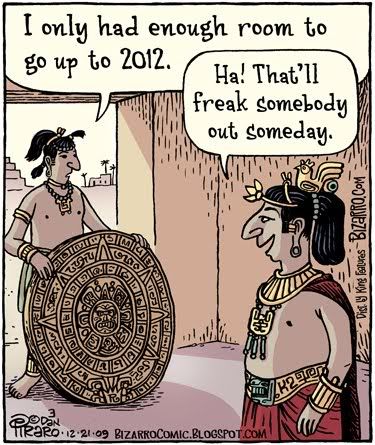
Comics add humor to our everyday lives amidst the newspaper pages full of death and despair. Although, intertwined among these humorous anecdotes there is often a small amount of commentary on life or modern culture. This way of going about social commentary through the combination of text and visual imagery is created in a way that many other communication forms could not fully form. In the Bizarro comics, created by Dan Piraro, this tends to be a common theme present in many, if not all of his panels and his December 21, 2009 comic is no exception. There is a message created through the use of commentary on a culturally relevant topic.

When creating my analysis of the Piraro comic, I have to be purposeful in my approach. Even within the narrow constraints of the panel in which the comic is drawn, the comic is not lacking in support for its argument. I hope to live up to these same standards within my own piece of writing. I want to create a piece that will inform and educate my audience about how the specific argument of the Piraro comic, that as a society we misread and negate the material constraints of a text and instead lay our own narrative over the text that undermines the importance and original purpose of that text, is formed through the use of rhetorical and aesthetic techniques, such as pathos through humor, text, and visual imagery. On a more broad level, I hope that my writing will inform my audience about various visual and rhetorical techniques are applied within comics to create an argument and that this information will help them to see the social commentary within and have a better understanding of the modern comic.
With these ambitious goals in mind, it is important for me to consider who my audience will be. On a primary level, the individuals who will be viewing my piece will be my teacher and my peers in my English class. These people are similar to myself and many have cultural lenses similar to my own through which they will be viewing the comic and my writing. These people will also be equipped with the knowledge of the same terminology that I will use when analyzing the rhetorical techniques. This combination of similarities between my primary audience and myself will allow them to understand what I am referring to within each part of my writing as well as see the same types of tools used to create the argument. But, on the other hand, these similarities will make them tough critics of my work, as they are equipped with the same knowledge that I am.
The context in which my primary audience will view my analysis is also an important consideration. I can imagine that this audience will be located in their office or dorm room and will be viewing my work in a peer review context. Knowing of this inevitable critique of my work will force me to consider its easiness to understand, depth, and level of polish and will make it a better piece with a more purposeful drive.
On a secondary level, the audience that might also be viewing my writing will be other bloggers or internet users. I do not know what their cultural or educational backgrounds will be. I will also be unaware of the context in which they are receiving it, whether they stumbled upon it while on the internet or whether they were seeking out blog posts. With all of these variables in mind, when creating this piece I will have to be sure that the ideas within my paper are translatable to a wide variety of people in a wide variety of contexts.

The comics we encounter everyday contain underlying social commentaries. I hope that through my analysis of one of these “everyday” comics by Dan Piraro I will shed light on one cultural anecdote. But if I am unable to fulfill the goals that I have set forth for myself, I will have not enlightened my audience with a few of the many rhetorical techniques used to create argument within the Piraro comic or any other comic they may come across. So– I do hope that my purpose for this piece is fulfilled, that I have effectively translated this purpose to my audience in their own context, and that I will have made the ordinary comic upon the pages of our newspapers, extraordinary.
No comments:
Post a Comment